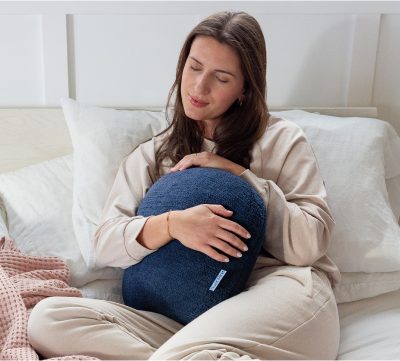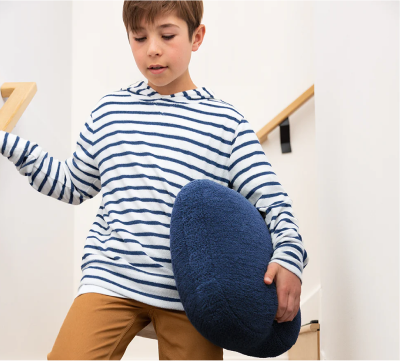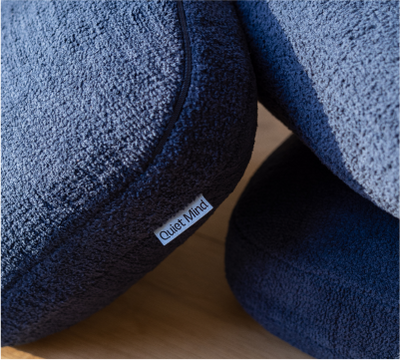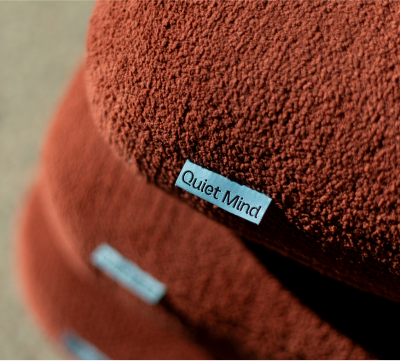There’s a kind of exhaustion that doesn’t lift, no matter how early you go to bed or how many hours you try to rest. You close your eyes, hoping to slip into sleep, but your body stays wired, or your thoughts stay loud. And when you finally do drift off, the sleep feels light, broken, or far too short.
Poor sleep touches more than just your nights. It spills into your mornings, your focus, your mood. It makes daily tasks feel heavier and calmer and harder to find. And when it lingers, it’s easy to wonder: What’s wrong with me?
But often, it’s not you, it’s your rhythm. The nervous system is out of sync. The sleep habits that quietly chip away at rest. The stress signals your body hasn’t had space to release.
In this guide, we’ll explore the real reasons behind poor sleep, including hidden factors that affect your sleep quality, and how to cure your poor sleep cycle. No pressure. No harsh fixes. Just slow, natural support to help you sleep better.
What’s Really Behind Poor Sleep? Common and Hidden Causes
Sleep is not a button to press. It’s a biological rhythm. It’s shaped by your environment, your internal state, and the signals your body receives throughout the day.
Sometimes, poor sleep is the result of a clear sleep disorder. Other times, it’s a pattern of small disruptions that build over time. Learning to recognize what’s interfering with your rest is the first step to restoring it.
The Daily Habits That Quietly Affect Sleep
Many things that feel normal can quietly affect your sleep. This includes late-night scrolling, an extra cup of coffee, or skipping your wind-down routine. You may not even realize it. Some common disruptors include:
- Caffeine too late in the day, especially after 6 p.m., can delay your ability to fall asleep.
- Alcohol before bed may help you fall asleep quickly but fragments deeper stages of sleep.
- Screens and artificial light in the evening block melatonin, the hormone that signals your body to prepare for rest.
- Irregular sleep schedules, like varying your bedtime on weekends, confuse your body’s internal clock.
These factors don’t just influence how fast you fall asleep. These habits influence how deeply you rest. They also affect how refreshed you feel in the morning.
Improving your sleep habits doesn’t require perfection. It simply asks for consistency, care, and room to listen to your body’s cues.
When Sleep Trouble Signals Something Deeper
Sometimes, disrupted sleep is more than just overstimulation. It’s a symptom of an underlying imbalance.
- You might be living with a sleep disorder such as sleep apnea, restless legs, or chronic insomnia. These conditions often go undiagnosed for years.
- Conditions such as chronic pain, acid reflux, or hormonal shifts can silently disrupt sleep throughout the night.
- Emotional health matters, too. Anxiety, depression, or trauma can make the body feel unsafe, even when you lie down to rest.
When sleep doesn’t improve despite habit changes, it may be time to look deeper. Getting help to treat insomnia or assess underlying medical issues can be the most caring next step. It’s not a sign of failure. It’s a path toward rest and the return of good sleep that truly supports you.
Can You Naturally Fix Poor Sleep Without Medication?
In many cases, yes. With consistency, patience, and attention to rhythm, the body remembers how to sleep.
Importance of Sleep Hygiene in Recovery
Sleep hygiene isn’t about being perfect. It’s about being intentional. It includes:
- A cool, dark, quiet bedroom.
- A regular sleep-wake schedule (even on weekends).
- No screens, stimulants, or big meals within 1–2 hours of bedtime.
- A gentle wind-down ritual, like reading or light stretching.
These small shifts, when practiced consistently, can reset your internal rhythm over time.
How Long Does It Take to Reset Sleep Patterns?
Sleep is like a tide. It moves with rhythm, not control. If your sleep has been disrupted for a while, it will likely take time to restore.
Resetting your sleep cycle can take anywhere from a few days to a few weeks, depending on your stress levels, health, and how long the pattern has been off. If you’re trying to treat insomnia or recover from burnout, the process may take time. But healing is still possible.
Look for small signs of progress:
- Falling asleep a bit faster.
- Waking up with slightly more ease.
- Feeling a little more steady in the morning.
These are the quiet markers that your body is remembering how to rest.
Proven Strategies to Improve Sleep Quality
The nervous system doesn’t respond well to pressure. It responds to rhythm, breath, and a sense of safety. These natural approaches don’t replace medical care when needed, but they can be powerful tools to support your sleep from the inside out.
Light and Darkness as Biological Signals
Light isn’t just visual. It also affects your hormones. Morning light helps regulate cortisol and alertness, while darkness allows melatonin to rise.
- Get natural sunlight within 1–2 hours of waking.
- Dim lights after sunset.
- Use blackout curtains or eye masks to support uninterrupted, healthy sleep.
Your body clock is sensitive. Shifting light patterns can gently reset your body’s internal rhythm in a natural way.
Caffeine, Alcohol, and Evening Stimulation
To help you sleep, your nervous system needs to slow down. Some simple ways to avoid overstimulation:
- Stop caffeine by mid-afternoon.
- Limit alcohol, especially close to bedtime.
- Turn off screens at least an hour before bed. Switch to something slower, like reading, breathing, or simply being quiet.
What you avoid is just as important as what you add.
Breathwork, Body Awareness, and Grounding
To rest deeply, your body needs to feel safe.
- Practice deep belly breathing to activate the parasympathetic system.
- Try box breathing (inhale for 4, hold for 4, exhale for 4, hold for 4).
- Try progressive muscle relaxation by gently tensing and releasing each part of your body, from your feet to your face.
- Imagine calming scenes like water, forests, or quiet rooms.
These aren’t just sleep techniques. They’re invitations for your body to soften.
Mind-Body Techniques to Calm the Nervous System
To sleep well, your body must feel safe. Techniques that anchor you in the present, such as breath, movement, or stillness, can help shift your nervous system from a state of alertness to one of rest.
Breathing Practices That Help You Sleep
Your breath is one of the most powerful regulators of your nervous system. It tells your body whether you're safe or on alert. And unlike other systems in the body, it’s one you can influence at any time.
- Deep belly breathing, where you inhale into your lower lungs, signals the parasympathetic system. This is your body’s built-in rest mode.
- Box breathing (inhale 4 counts, hold 4, exhale 4, hold 4) can reduce racing thoughts and shift you out of a stress state.
- Even five minutes of slow, intentional breathing before you go to bed can make a noticeable difference in how quickly and peacefully you fall asleep.
These gentle practices can support better sleep and gradually build emotional resilience.
Visualization and Muscle Relaxation
When your body holds tension, sleep becomes harder. Visualization and muscle release help transition you from high alert to deep rest.
- Progressive Muscle Relaxation (PMR) involves moving through different muscle groups, one by one, with soft tension and release. This process increases body awareness and eases stored tension that can affect your sleep.
- Visualization taps into your imagination to calm the brain. Picture a soothing space: a quiet forest, soft waves, or a dimly lit room. Let yourself linger there. This signals your brain that it’s time to rest.
Practicing these techniques regularly, even for just a few minutes each night, can create a gentle bridge from wakefulness to sleep without relying on a sleep aid.
Gentle Movement as a Sleep Ritual
Stillness doesn’t always come easily. For some, gentle movement helps discharge the day’s energy so the body can enter rest with less resistance.
- Try slow, flowing stretches or restorative yoga poses.
- Do a short walk after dinner to reset your rhythm.
- Pair movement with breath to create a calming sensory loop.
These habits don’t just prepare your body for sleep. They strengthen your overall sleep patterns, helping you wind down more easily each evening.
Letting Rest Be Simple
You don’t have to earn sleep. You don’t have to get it “right.” What your body needs is not perfection, but permission. Permission to slow down, to soften, and to rest without pressure.
These mind-body practices don’t fix everything overnight. But with time and consistency, they build safety into your routine. These practices support sleep not by forcing it, but by gently inviting it. And when practiced regularly, they become part of the rhythm that helps you get deeper, steadier rest.
Sometimes, the most effective way to improve your sleep is not to do more, but to feel supported in doing less.
Can Supplements or Natural Aids Help Poor Sleep?
Some natural sleep remedies can help, especially when used with intention. They are not a replacement for routine and rest, but a complement to it. Sometimes the healthiest sleeping aid is the one that works gently, not forcefully.
Why Natural Sleep Aids Don’t Work for Everyone
Sleep is deeply individual. Your body’s response to a supplement can depend on things like:
- Genetics
- Hormone levels
- Medications
- Underlying conditions
What helps one person sleep might make another feel groggy, wired, or disconnected. That’s why it’s important to approach any sleep aid as part of a broader, body-aware plan. It should be a gentle support, not the entire solution.
If you’re trying to treat insomnia or reset a long-disrupted rhythm, consistency matters more than strength. A supplement may help you get to sleep, but real healing comes from creating an environment where your body feels safe enough to rest.
Supplements That May Help You Sleep Better
When used mindfully, certain natural sleep aids can support a return to rhythm. These include:
- Melatonin: A hormone your body already produces, melatonin helps reset your sleep-wake cycle, especially if your internal clock is out of sync from shift work or jet lag.
- Magnesium: This mineral supports muscle relaxation, nerve regulation, and helps you sleep. Low magnesium levels can be a hidden cause of insomnia.
- Herbal supports: Plants like valerian and passionflower have calming properties that can promote emotional stillness and physical ease.
If you’re exploring these options, start with low doses, stick to a routine, and track how your body responds. And always consult with a healthcare provider, especially if you’re taking medication or managing a health condition.
How to Use Sleep Aids Responsibly
Supplements are most helpful when paired with strong sleep habits. Sleep aids should enhance your evening routine, calming rituals, and nervous system care. They are not meant to replace them.
Keep in mind:
- Don’t combine multiple sedating supplements unless guided by a professional.
- Avoid taking sleep aids long-term unless advised by a healthcare provider.
- If something feels off, pause. Your body often knows when something isn’t working.
At Quiet Mind, we believe support should feel gentle. That’s why our scented weighted pillows are designed to be quiet companions. They combine calming pressure with subtle, natural aromas to help ease your body into rest; without overwhelming your senses. It’s a soft, grounding way to support sleep naturally and on your own terms.
When to Seek Help for Persistent Sleep Problems
Sometimes, no matter how gentle your routine, how consistent your habits, or how calming your environment, sleep still doesn’t come. You do everything “right,” but the rest you long for continues to feel just out of reach.
This doesn’t mean you’ve failed. It means your body may need deeper support.
If poor sleep has become a pattern lasting for weeks or months, especially if it’s interfering with your ability to function during the day, it may be a sign that something more complex is happening. Many people struggle silently with a sleep disorder for years before receiving the help they need.
Here are signs it may be time to seek professional guidance:
- You regularly take over 30 minutes to fall asleep, even when tired.
- You wake up multiple times each night and struggle to fall back asleep.
- You wake too early, with difficulty returning to sleep.
- You experience loud snoring, gasping, or pauses in breathing during sleep.
- You may feel groggy, irritable, or unfocused most days, even after a full night in bed.
- You’ve tried changing your sleep habits and environment with little or no improvement.
- You rely heavily on a sleep aid just to get through the night.
These symptoms could be linked to conditions such as insomnia, sleep apnea, restless leg syndrome, or anxiety-related disturbances. All of these can impact both sleep and long-term health. In many cases, they’re highly treatable with the right support.
Final Thoughts
Sleep is not something you win at. It’s something you return to.
For many people, the journey to better sleep begins not with a supplement or a quick fix, but with a quiet shift in how we relate to rest. When we begin to honor the body’s signals, protect its rhythm, and move through our days with more awareness, we create a foundation for healthy sleep. One that is rooted in safety, not stress.
If you’ve been living with disrupted nights or long stretches of exhaustion, it’s easy to feel discouraged. But poor sleep doesn’t mean you’re broken. Often, this means your system is doing its best to adapt under pressure. What it needs is care, not control.
Whether you’re trying to treat insomnia, reset your sleep schedule, or release habits that subtly affect your sleep, start with consistency and kindness. Evening routines, calming techniques, and the right kind of support, used consistently and with compassion, can help you reconnect with rest, one night at a time.
About Quiet Mind
At Quiet Mind, we know that poor sleep isn’t just about the night. It’s about everything your body carries through the day. The tension that never settles. The thoughts that don’t quiet. The rhythm that’s forgotten how to return.
Our signature weighted pillow is designed to meet those moments with steady, grounding pressure. Not to fix your sleep, but to support the conditions that make rest possible: safety, stillness, and sensory calm.
Whether you’re easing out of over-alertness or relearning how to feel held, Quiet Mind offers a simple invitation back to rhythm. No noise. No force. Just enough weight to remind your body: it’s okay to let go.
Frequently Asked Questions
What is insomnia, and how is it different from poor sleep?
Insomnia is a chronic condition where falling or staying asleep is difficult. Poor sleep may be short-term or situational. Both disrupt rest, but insomnia often requires targeted intervention.
How can I improve my sleep hygiene?
Create a consistent schedule, dim the lights in the evening, avoid screens and stimulants before bed, and design a calming nighttime routine.
What are some natural remedies for insomnia?
Melatonin, magnesium, valerian root, and calming practices like meditation and breathwork may support improved sleep.
How long does it take to reset my sleep patterns?
Most people see improvements in 1–3 weeks with consistent routines. Longer-standing issues may take more time and care.
Can sleep apnea be treated at home?
Mild sleep apnea may respond to weight loss or sleep position adjustments, but most cases require professional diagnosis and treatment (e.g., CPAP therapy).
What are the symptoms of sleep deprivation?
Mood swings, reduced focus, memory lapses, increased cravings, and frequent colds or illness may all be signs of inadequate rest.

















